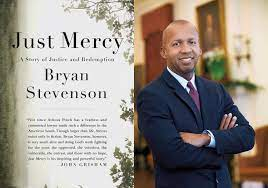
We are excited to announce our summer OER Conference for Social Studies Book Club pick! This month you are invited to join us in reading Just Mercy by Bryan Stevenson, who happens to be our keynote speaker on August 3. He is the founder and Executive Director of the Equal Justice Initiative, a human rights organization in Montgomery, Alabama. Under his leadership, EJI has won major legal challenges eliminating excessive and unfair sentencing, exonerating innocent death row prisoners, confronting abuse of the incarcerated and the mentally ill, and aiding children prosecuted as adults.
Our community discussion about Just Mercy will be led by Jayson Wilkinson from the OER Project Team, and Hajra Saeed, BHP teacher in Long Beach, CA. We’ll kick off with our first book club driving question on July 15 right here in this thread, located in the OER Conference for Social Studies discussion forum. We’ll post a new driving question each Thursday for three weeks leading up to the conference which takes place August 3-5. So don't wait, grab a copy of the book, bookmark this thread so you can return on the 15th, and prepare for some rich discussions with other members of the community. Let the reading begin!
Just Mercy // Week One Questions
We are excited to start our book club conversation on Just Mercy as we make our way to Bryan Stevenson’s August 3rd keynote address in the OER Conference for Social Studies. Post your thoughts and answers to the questions below, or add your own question. Jayson Wilkinson and Hajra Saeed will be leading the conversation and will be checking in throughout the day to respond to the discussion.
- Did Just Mercy make you want to explore an aspect of the U.S. criminal justice system more closely? If so, what part and why?
- In Just Mercy, Stevenson tells us his story of growth and discovery in relation to his understanding of the U.S. criminal justice system. Have you had a similar journey in your own life?
Post your comments below and let's get the conversation started!
Just Mercy // Week Two Questions
- As you are reading Just Mercy, is there a quote that "sticks with you?" Why?
- Is there a specific call to action that can be taken from a reading of Just Mercy? If so, what is it?
Let's continue the conversation by posting in the comments below.
Just Mercy // Week Three Questions
- How do the topics and concepts in Just Mercy connect to your work with students?
- What lessons from Just Mercy or Stevenson are you taking with you as you prepare to welcome students back to our school communities in the fall?
- Do know of a specific person (whether they are a personal connection, colleague, or something else) that would benefit from reading and discussing Just Mercy with you? What makes you think that and what lessons might they learn?
Post your response to the questions in the comments below as we complete our final week of the Book Club. Be sure to join us for Bryan Stevenson's Keynote Address on August 3 at 9:00 AM PDT!
